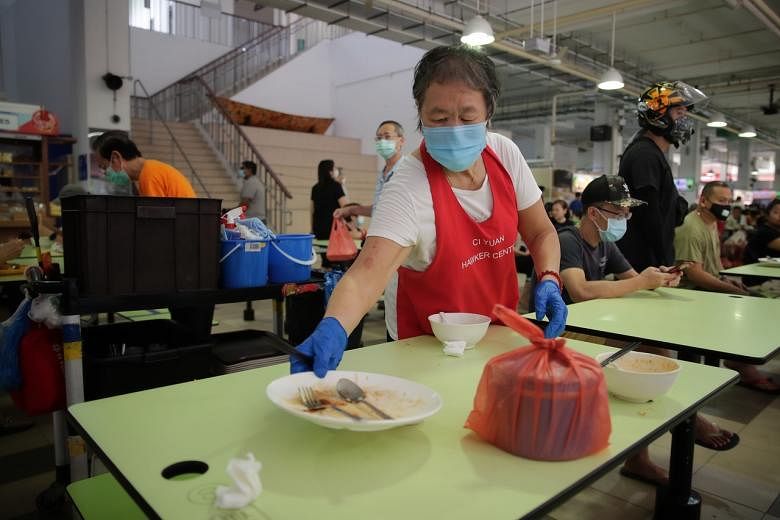Did Singapore just miss a golden opportunity to get its cleaning act together?
I fear we might have.
When the Covid-19 pandemic struck, it was the perfect time to get everyone thinking and acting on personal and public hygiene.
Suddenly, it became a matter of life and death to wear a mask, wash your hands and keep your surroundings clean.
Everywhere you went, cleaners were busy mopping the floors, wiping down tables and chairs, and bus and MRT seats. Even lift buttons were not spared the sanitising treatment.
Singapore was never cleaner.
But more important, the message appeared to have got through to most people that you do your bit to keep Singapore clean and germ-free not just to protect your own health but everyone else's too.
That is why you wear a mask, not just to stop the virus from harming you but also to prevent you from spreading it if you were infected.
The pandemic brought home this simple truth that what we do as individuals has a profound impact on other people, including whether they live or die.
If ever there was a perfect time to nail the Keep Singapore Clean motto, this was it.
Alas, the moment was not seized and I fear the momentum has been lost. With the relaxation of Covid-19 measures, there is no longer the same heightened sensitivity to maintain personal and public hygiene standards.
You only have to look at what happened to the state of public cleanliness during the traditional Hungry Ghost period.
For about four weeks every year, parts of the country resemble a giant, smoking incense cauldron, with the burning of joss sticks, candles and paper paraphernalia in public, on roadside kerbs, grass patches, beside open drains, and anywhere the believers see fit, apart from the designated pits provided.
No one bothers to clean up the place after these religious acts, and so the leftover offerings which sometimes include food are strewn all over the place, adding to the filth and litter that cleaners have to clear up later.
There was even a video which went viral of a car with its back bumper in flames from burning candles placed at an open-air carpark. The unsuspecting driver had reversed his car into the spot, not knowing the parking space had been converted by someone into a meeting place with the spirits.
In a pre-Covid-19 world, most of us put up with this yearly affair, even though I suspect many Singaporeans would rather not.
In multiracial, multi-religious Singapore, it seems bad form to criticise another religion's practice, and so we live and let live.
But a line should be drawn when the actions of a group endanger public health and cleanliness in a Covid-19 world.

Another example of bad social behaviour which the pandemic has not reversed: returning food trays, plates and whatever that is left after you have finished your meal so the table is cleared for the next patron.
This isn't just a tray-return problem but a wider issue of making Singaporeans responsible for keeping their environment safe and healthy.
As a reader of this newspaper, Mr Ang Tun Lung, noted in a letter last month: "The appalling state of our hawker centres leaves much to be desired.
"Scavengers like pigeons fly in quickly to feed on the leftovers, and flocks are seen on the tables while other patrons are consuming their meals nearby."
He was describing a sight familiar to those who patronise hawker centres, and like the problem with the Hungry Ghost Festival, most people put up with it and just look away.
But this is precisely the issue: When a small problem is left unattended, it becomes part of the acceptable norm and very quickly the practice spreads and gets out of hand.
Social scientists call this the broken window theory: If a window in a building is broken and left unrepaired, all the other windows will soon be broken too.
As the authors of the theory wrote in 1982: "An unrepaired broken window is a signal that no one cares, and so breaking more windows costs nothing."
Think of dirty hawker centres as broken windows in the fight to keep Singapore clean and safe.
Uncleared tables with birds picking on leftover food is a signal that no one really cares about public hygiene and cleanliness in Singapore.
It does not matter if you do a whole list of other things and spend large sums of money to clean up the country.
When the Government announced that it was stepping up its efforts to do this, as part of the fight against this and future pandemics, I thought it was absolutely the right move, and about time.
From reports on the proposed new laws which will be introduced in Parliament this month, the changes include mandatory cleaning standards, specifying frequency of cleaning, and placing greater accountability on owners of premises.
All of these requirements may help, but they will not be enough if there are other areas where nothing has changed.
Inculcating a sense of civic responsibility towards public hygiene and cleanliness is an all or nothing effort - like wearing masks where no one is allowed to do otherwise.
There has to be a zero-tolerance mindset.
On tray return, for example, it isn't surprising that after so many years with numerous campaigns, 36 per cent of people surveyed said they were unsure if trays should be returned.
When they see with their own eyes so many uncleared tables at hawker centres, how can they not come to the conclusion that it is not necessary?
How to achieve a change in public attitude on this?
There have been many suggestions, some of which have been tried, including monetary incentives for those who return their trays.
My suggestion: Do not focus overly on what the right solutions are, which is what the authorities have been doing.
Instead, adopt the attitude that whatever methods are used you have to make sure that every table will be cleared because one uncleared table will lead to many more such tables.
You have to adopt the same approach to the burning of joss sticks in public.
In fact, the two are inextricably linked and the more instances you have of unattended joss sticks littering public places, the more tables will be left uncleared.
Every anti-social and irresponsible act visible to the public sends the signal that we are not serious about public hygiene and cleanliness, and this will lead to similar behaviour, elsewhere and everywhere.
When you adopt a zero-tolerance approach, the problem will look completely different, and the right solutions will eventually be found.
The pandemic was the moment to make this commitment.
I hope it is not too late.
• Han Fook Kwang is also senior fellow at the S. Rajaratnam School of International Studies, Nanyang Technological University.













